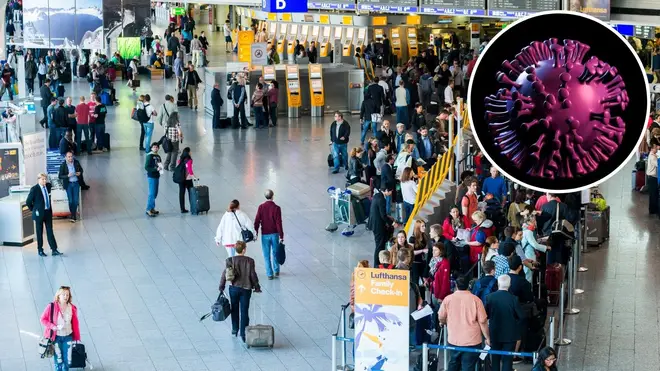
Clive Bull 1am - 4am
27 November 2021, 11:14 | Updated: 7 June 2023, 08:56

Two cases of the Omicron variant of coronavirus have been discovered in Germany.
They were both found in the southern state of Bavaria.
It followed one minister in the German state of Hesse, who said earlier on Saturday that the variant had very probably arrived in the country.
"Last night several Omicron-typical mutations were found in a traveler returning from South Africa," tweeted Kai Klose, social affairs minister in the western German state that is home to Frankfurt airport.
A full sequencing of the variant is being carried out.

'We want to keep a lid' on spread of Omicron
Meanwhile officials in Amsterdam say 61 people who have arrived there on flights from South Africa have tested positive for Covid.
Work is under way to tweak vaccines against the new concerning strain of coronavirus that has sparked travel bans.
The strain, named Omicron and designated a "variant of concern" by the World Health Organisation (WHO), has already reached Belgium after being discovered in South Africa.
Read more: Countries around the world bring in travel bans in race to contain Omicron Covid variant
The WHO warned that preliminary evidence suggests the variant has an increased risk of reinfection and may spread more rapidly than other strains.
A number of pharmaceutical firms have said they are working to adapt their vaccines in light of the emergence of Omicron.
Health Secretary Sajid Javid said there is "huge international concern" surrounding the strain after banning flights from South Africa, Botswana, Lesotho, Eswatini, Zimbabwe and Namibia to limit its spread.
Mr Javid told MPs there are concerns the variant may be more transmissible, make existing vaccines less effective, and it may hinder one of the UK's Covid treatments, Ronapreve.
Ministers were facing calls to go further to prevent a wave of the new variant arriving in Britain while a Delta surge is ongoing, as Belgium became the first EU country to announce a case.
The EU, US and Canada all followed Britain's move to impose travel restrictions on visitors from southern Africa ahead of the WHO adding the strain, also known as B.1.1.529, to its highest category for concerning variants.
Experts at the WHO said there is early evidence to suggest Omicron has an "increased risk of reinfection" and its rapid spread in South Africa suggests it has a "growth advantage".
Novavax said it has "already initiated development of a new recombinant spike protein based on the known genetic sequence of B.1.1.529 and will have it ready to begin testing and manufacturing within the next few weeks".
Moderna said: "Since early 2021, Moderna has advanced a comprehensive strategy to anticipate new variants of concern.
"This strategy includes three levels of response should the currently authorized 50 ?g (microgram) booster dose of mRNA-1273 prove insufficient to boost waning immunity against the Omicron variant."
Pfizer and BioNTech said that in the event of a variant which could escape the effects of the vaccines, the firm expects "to be able to develop and produce a tailor-made vaccine against that variant in approximately 100 days, subject to regulatory approval".
AstraZeneca said it has "developed, in close collaboration with Oxford University, a vaccine platform that enables us to respond quickly to new variants that may emerge" and is "already conducting research in locations where the variant has been identified".
The firm is also testing its antibody combination drug against the new variant and is "hopeful" it "will retain efficacy since it comprises two potent antibodies with different and complementary activities against the virus".